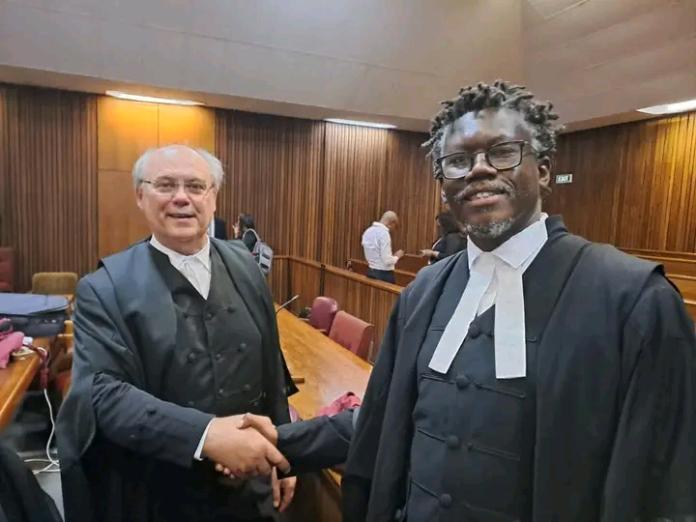Africa-Press – Zambia. In the South African High Court today, Advocate Tembeka Ngcukaitobi, representing the family of Zambia’s late President Edgar Chagwa Lungu, delivered a scathing response to the Zambian government’s weak five-minute opposition to the family’s leave to appeal over the disputed burial of the former president.
The hearing highlighted issues that go far beyond one family’s grief, touching on constitutional rights, international law, sovereignty, and the limits of state power.
Ngcukaitobi described the Zambian government’s position as a “dangerous road” that, if accepted, would deprive widows of their fundamental rights to decide on the burial of their spouses. At the heart of the legal dispute is the government’s argument that a foreign contract or law could override Mrs. Esther Lungu’s authority, even though the remains are in South Africa.
“My learned friend accepts that the agreement is to be interpreted according to South African law,” Ngcukaitobi told the court.
“But then he claims that because the next of kin is Zambian, the right to bury must be Zambian. That distinction simply does not exist. Lex loci the law of the place governs the entire dispute. Once South African law applies, Zambian law becomes irrelevant. This is not just a technicality it goes to the very heart of family autonomy and sovereignty.”
The advocate systematically addressed the core grounds of the appeal. First, he highlighted the distinction between rights of the living versus the dead.
“A corpse has no legal rights. Once life ends, rights end. What the Zambian government is attempting reinstating benefits posthumously is artificial and legally unsound. Any benefits attached to the office of the president exist for the widow, not the deceased.”
Next, Ngcukaitobi tackled the Kaunda precedent, which the Zambian government had cited. He explained that Kaunda died while still enjoying state benefits, whereas Mr. Lungu had lost his presidential benefits before death.
“You cannot reinstate benefits on a corpse. That is not law. That is fantasy,” he said.
A second key ground of the appeal concerns the enforceability of contracts over human remains. South African law, as reinforced by authorities including Foote and Xhoshias, holds that such contracts are invalid.
“If the court accepts that a state can enforce a contract over a corpse against the family’s wishes, we are creating a completely new and dangerous legal principle one that directly contradicts common law and constitutional protections,” Ngcukaitobi argued.
The third ground relates to the rights of the spouse versus state or public interest claims. Citing South African law, he emphasized that a widow’s authority over the burial is “basically unqualified.” Even in cases where governments claim public interest, the family’s decision is paramount.
“Family trumps government every time. No law, foreign or domestic, can override the widow’s decision,” he said, referencing the another South African case and other precedents to illustrate the danger of allowing governments to seize control over family matters.
Ngcukaitobi also addressed the procedural problem of proving foreign law. In South African courts, the law of a foreign state is treated as a matter of fact, requiring expert evidence.
“The Zambian government has provided no affidavits or credible evidence to establish Zambian law. They merely assert what they want to be true. That is insufficient to override the clear rights of the widow,” he said.
Finally, the advocate stressed the constitutional implications. Zambia’s Constitution, like South Africa’s, guarantees privacy, dignity, and equality. These rights extend to Mrs. Lungu, ensuring that no government can compel her to accept state-directed burial benefits or arrangements against her will.
“The case is fact-specific,” Ngcukaitobi conceded.
“But precisely because it is unique, it demands the attention of the Supreme Court of Appeal. The principles at stake will resonate far beyond this family.”
Turning to the broader implications, Ngcukaitobi warned against setting a precedent that would allow foreign states to project power extraterritorially, overriding the sovereignty of South African courts and the rights of families.
“This is not just about Mr. Lungu or his widow. It is about protecting the autonomy of families, the dignity of the deceased, and the constitutional integrity of our courts,” he said.
Ngcukaitobi concluded with a forceful appeal to the court: “What you cannot have is a government, any government, overriding the widow’s decision on how to bury her husband. That is not just law that is humanity.”
The High Court has now reserved judgment, leaving many across the region awaiting a decision that could set a landmark precedent on family rights, state power, and the limits of foreign influence in sensitive matters of burial and dignity.
Today, the Zambian government’s five-minute intervention appeared rushed, thin, and legally fragile, leaving the Lungu family’s appeal strong, principled, and firmly rooted in both law and human dignity. And from the onset the Zambian Government have been arguing a case without referencing it to any law.
For More News And Analysis About Zambia Follow Africa-Press







